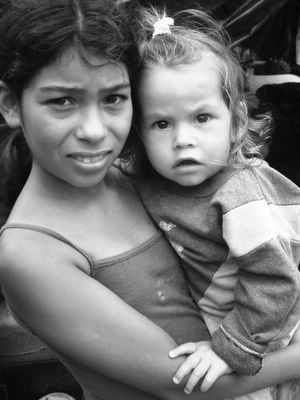
Young girl and her baby sister. MST camp outside Porto Alegre, Brasil. 1 February 2005. Photo by sep
Without land.
One of the most visible and vocal groups at the Fifth World Social Forum in Porto Alegre was the MST-the Landless Workers Movement in Brazil(http://www.mstbrazil.org/). MST is at the frontlines of the global war against poverty. For years, MST has been reclaiming people’s right to land and development through their radical strategy of land occupation.
With the help of people from Via Campesina, the international network of peasant movements, I together with the other members of the Focus delegation, visted two MST sites outside Porto Alegre. First was the camp where around 80 families live, cramped together in makeshift huts made out of black plastic bags erected on a small piece of occupied land near the highway. The ‘camp’ represents stage one of the occupation. Life in the camp seems harsh and difficult with no electricity, inadequate water, limited food and with the people there exposed to all the elements-the cold breeze at nite, rain, dust and the harassment from both the police and the private para-military guards of the idle property. From camps like these, MST communities launch their campaign to reclaim lands. They engage in dialogue with government, conduct mass mobilizations to make idle lands productive for the benefit of peasant communities.
I have stayed in impoverished communities before and have stared at faces hardened by deprivation and defeated by hopelessness. While the people in the MST camp still do struggle with their own personal demons of alcoholism and violence, what I saw in the faces of the people there, especially the children, was dignity and determination instead of defeat.
The second site we visited, a little farther away from the city, was a community re-named Filho de Sepe (“son of Sepe”). Sepe was a local hero that the community chose to honor by naming their new home after him. In sharp contrast to the camp we visited in the morning, the ‘settlement’ --as they call areas that they have successfully reclaimed—was a picture of a productive and vibrant community where people worked together to accomplish their collective goals. Here, small but decent houses made of concrete have replaced the black-plastic huts we saw in the camp. The settlement still faces a lot of challenges to make it viable and sustainable especially amid the threat of corporate globalization, but to me it represented a symbol of hope for the many who are struggling for dignity.
At the MST settlement we sat down and chatted with Marco, one of the leaders of the community, over a home-cooked meal of rice, potatoes, baked beans, and vegetables—to many of us the best and definitely most satisfying meal we've had during our short stay in Brazil.


No comments:
Post a Comment